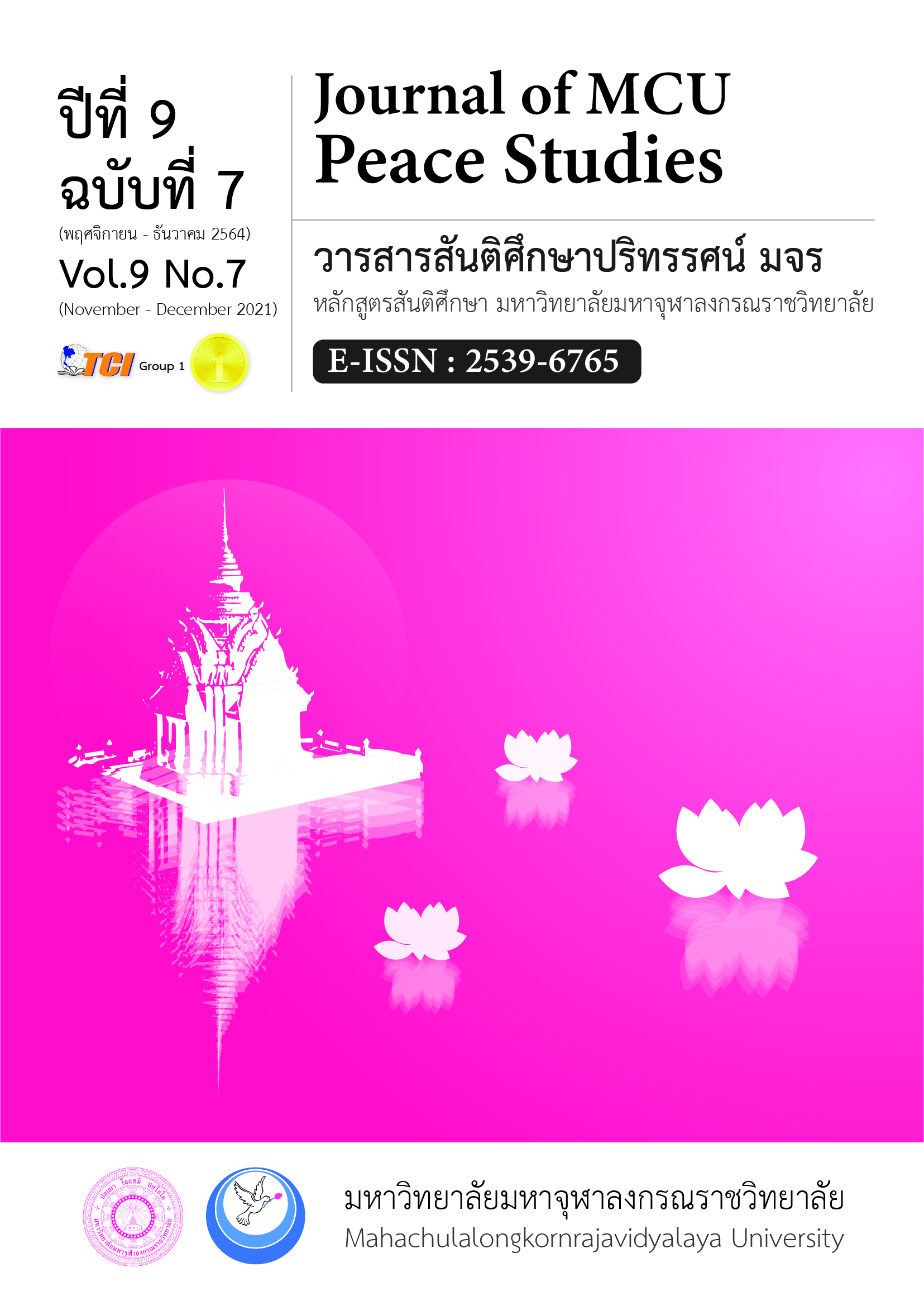รูปแบบการพัฒนาภาวะผู้นำการเรียนรู้ของผู้บริหารสถานศึกษา สังกัดสำนักงานเขตพื้นที่การศึกษามัธยมศึกษา
Main Article Content
บทคัดย่อ
บทความนี้มีวัตถุประสงค์เพื่อ 1) เพื่อศึกษาภาวะผู้นำการเรียนรู้ของผู้บริหารสถานศึกษา 2) เพื่อสร้างรูปแบบการพัฒนาภาวะผู้นำการเรียนรู้ของผู้บริหารสถานศึกษา 3) เพื่อทดลองการใช้รูปแบบการพัฒนาภาวะผู้นำการเรียนรู้ของผู้บริหารสถานศึกษา และ 4) เพื่อประเมินรูปแบบการพัฒนาภาวะผู้นำการเรียนรู้ของผู้บริหารสถานศึกษา สังกัดสำนักงานเขตพื้นที่การศึกษามัธยมศึกษา เป็นงานวิจัยแบบผสม ด้วยการศึกษาจากเอกสารงานวิจัยที่เกี่ยวข้องและสัมภาษณ์ผู้บริหารสถานศึกษา สำนักงานเขตพื้นที่การศึกษามัธยมศึกษา เขต 29 จำนวน 81 คน เครื่องมือที่ใช้ในการเก็บรวบรวมข้อมูล ได้แก่ แบบสอบถามวิเคราะห์ข้อมูลโดยการแจกแจงความถี่ ร้อยละ ค่าเฉลี่ย และส่วนเบี่ยงเบนมาตรฐาน ผลการวิจัยพบว่า ผู้บริหารสถานศึกษาส่วนใหญ่ มีประสบการณ์ในการทำงานสายบริหารสถานศึกษา 6 – 10 ปี (ร้อยละ 46.67) วุฒิทางการศึกษาระดับปริญญาโท มากที่สุด (ร้อยละ 73.33) บทบาทหน้าที่ปัจจุบันผู้บริหารสถานศึกษา (ร้อยละ 86.67) รูปแบบการพัฒนาภาวะผู้นำการเรียนรู้ของผู้บริหารสถานศึกษามัธยมศึกษา มีองค์ประกอบหลัก 6 องค์ประกอบ คือ 1) ด้านการส่งเสริมชุมชนแห่งการเรียนรู้ทางวิชาชีพ มี 4 องค์ประกอบย่อย 11 ตัวชี้วัด 2) ด้านการสร้างวิสัยทัศน์ร่วม มี 4 องค์ประกอบย่อย 12 ตัวชี้วัด 3) ด้านการทำงานเป็นทีม มี 4องค์ประกอบย่อย 14 ตัวชี้วัด 4) ด้านการนำเทคโนโลยีมาใช้ในการปฏิบัติงาน มี 4 องค์ประกอบย่อย 14 ตัวชี้วัด 5) ด้านการมีภาวะผู้นำการเปลี่ยนแปลง มี 4 องค์ประกอบย่อย 16 ตัวชี้วัด และ 6) ด้านการมีความคิดสร้างสรรค์ มี 4 องค์ประกอบย่อย 14 ตัวชี้วัด ผลการประเมินรูปแบบการพัฒนาภาวะผู้นำการเรียนรู้ของผู้บริหารสถานศึกษา พบว่า ด้านความเหมาะสมอยู่ในระดับมาก (ค่าเฉลี่ย 4.10) ด้านความเป็นไปได้อยู่ในระดับมาก (ค่าเฉลี่ย 4.15) และด้านความเป็นประโยชน์อยู่ในระดับมาก (ค่าเฉลี่ย 4.08) เมื่อพิจารณาภาพรวมของรูปแบบอยู่ในระดับมาก (ค่าเฉลี่ย 4.11)
Article Details

อนุญาตภายใต้เงื่อนไข Creative Commons Attribution-NonCommercial-NoDerivatives 4.0 International License.
ทัศนะและความคิดเห็นที่ปรากฏในบทความในวารสาร ถือเป็นความรับผิดชอบของผู้เขียนบทความนั้น และไม่ถือเป็นทัศนะและความรับผิดชอบของกองบรรณาธิการ ยินยอมว่าบทความเป็นลิขสิทธิ์ของวารสาร
เอกสารอ้างอิง
Chitrojanarak, R. (2005). Development of the administrative model of the basic educational institution committees for Thailand. (Doctoral Dissertation). Educational Administration Program: Chulalongkorn university. Bangkok.
Chomchoy, S. (2018). School administration in the digital age. Bangkok: Chulalongkorn Printing House university.
Jarungkiatkul, S. (2013). The future a learning society model image for a positive paradigm shift for communities. (Doctoral Dissertation). Academic field Outside the school system, Chulalongkorn University. Bangkok.
Kaewkanok, S. (2014). Creation of a transformational leadership development kit for the school administrators Elementary level basis. (Doctoral Dissertation). Educational Ubon Ratchathani Rajabhat University. Ubon Ratchathani.
Makasiranon, K. (2014). Development of a learning organization. Bangkok: S. Asia Press Company (1989) Ltd.
Permanent Secretary, Ministry of Education, Office. (2017). Ministry of Education's Educational Development Plan, Issue 12 (2017 - 2021) (copy document). [A.D. 2017]. Bangkok: Office of the Permanent Secretary for Education Ministry of Education.
Rooncharoen, T. (2011). Strategies for the development of a learning person. Bangkok: Khawfang Publishing Company Limited.
Somprach, K. (2016). Leadership and learning leadership for school administrators. Khon Kaen: Klang Nan Wittaya Printing Co., Ltd., Part.
Surakitbawon, S. (2006). Professional management leadership In case of educationadministrators and school administrators. Bangkok: Suririyasan.
Vinitjakun, T. (2018). Thongchai Winitjakul shines Thailand 4.0 in the age of reversal – Disruption Era and The 4th Industrial Revolution. Matichon Weekend, 38-39.
Du Four, R. (1998). Professional Learning Community at Work: Best Practices for Enhancing Student Achievement. (8th ed.). Bloomington: Solution Tree.
Senge, P. (1990). The Fiefh Discipline: The art and Practice of the Learning Organization. New York: Currency Doubleday


